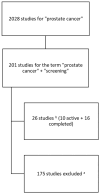Prostate Cancer-Research Advances in Early Detection
- PMID: 40364098
- PMCID: PMC12072474
- DOI: 10.3390/jcm14093067
Prostate Cancer-Research Advances in Early Detection
Abstract
Screening is widely considered one of the most effective methods for the early detection of prostate cancer. Early detection allows for prompt treatment, which increases the likelihood of a full recovery. This review sought to summarize studies on screening methods related to prostate cancer. It examined trends in screening practices and organized the findings into two main categories. The first category focused on strategies to boost screening participation, reach underserved populations, and improve public awareness of health issues. The second category concentrated on refining current diagnostic methods, developing new tests, and testing biomarkers. A significant portion of the research also explored diagnostic techniques aimed at enhancing patient comfort during exams without compromising clinical effectiveness.
Keywords: clinical trial; prostate cancer; screening.
Conflict of interest statement
The authors declare no conflicts of interest.
Figures


References
-
- WHO International Agency for Research on Cancer. [(accessed on 31 March 2025)]. Available online: https://gco.iarc.who.int/media/globocan/factsheets/cancers/27-prostate-f....
-
- European Commission Prostate Cancer Burden in EU-27. [(accessed on 31 March 2025)]. Available online: https://ecis.jrc.ec.europa.eu/sites/default/files/2023-12/prostate_cance....
-
- American Cancer Society Prostate Cancer Risk Factors. [(accessed on 31 March 2025)]. Available online: https://www.cancer.org/cancer/types/prostate-cancer/causes-risks-prevent....
Publication types
LinkOut - more resources
Full Text Sources

